Iran's President Compares Ties With Israel To Firendship With A Snake
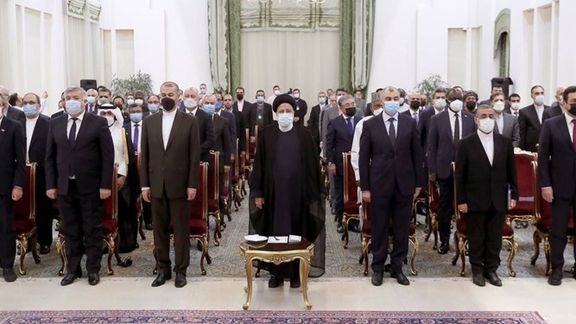
Islamic countries should be aware of Israel’s "evil intentions" Iran’s president Ebrahim Raisi told ambassadors of Islamic countries at a reception on Thursday.

Islamic countries should be aware of Israel’s "evil intentions" Iran’s president Ebrahim Raisi told ambassadors of Islamic countries at a reception on Thursday.
Those Muslim countries that "normalize relations with the blood-shedding Zionist regime resemble those who would keep a snake in their sleeves," Raisi said, as envoys were invited to mark the end of the Muslim month of Ramadan, ending on Friday in Iran.
Every year during Ramadan Iran marks the Quds or Jerusalem Day to highlight its support for Palestinians and its enmity with Israel.
Raisi who highlighted Muslim unity in his speech, without naming any country, was implicitly criticizing the United Arab Emirates, Bahrain and other Arab countries that have signed normalization agreements with Israel. He claimed that establishing ties with Israel will anger two billion Muslims in the world.
Since August 2020, when the UAE and Bahrain signed the Abraham accords with Israel, with the mediation of the United States, mainly Iran has criticized their action. Other Arab countries such as Egypt and Morocco also have normal ties with Israel.
Raisi also compared Israel with fundamentalist Sunni Muslim extremists that he called Takfiris and said that if Muslim youth had not resisted, Israel "like Takfiris would have swallowed regional countries."
Iran financially and militarily supports an array of Palestinian and other groups who conduct attacks against Israel.
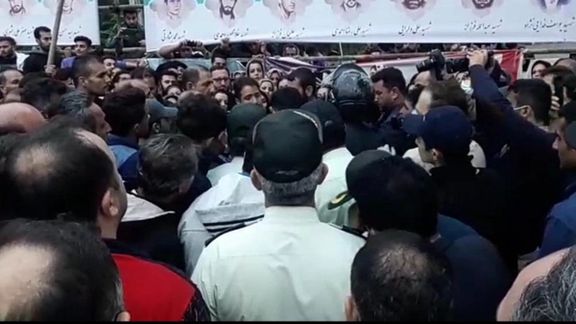
Iran’s anti-riot police cracked down on people peacefully protesting unsanitary dumping of waste at a local landfill in northern Iran.
A group of residents of the village of Saravan in Iran’s northern Gilan province started a peaceful protest on Thursday, but after police intervention, protesters began throwing stones. Five officers were injured and several protesters arrested.
According to videos circulating inthe socialmedia police used guns and teargas during the clashes.
Furious at the failure of the local authorities to close the gigantic waste landfill, people had been blocking the entrance of the garbage dump for more than two weeks to stop trash trucks from reaching the site.
Piles of stinking rubbish at the Saravan site now tower some 90 meters (295 feet) high, and according to estimates the volume of the waste exceeds one million tons while about a thousand tons is added to it daily.
Waste from the provincial capital Rasht and seven other cities has been dumped there for nearly four decades.
Protesters say the landfill, reportedly due to close next year, is causing diseases and health problems, and demand the site be closed immediately.
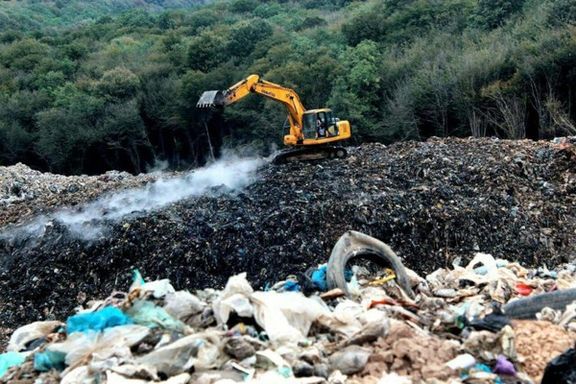
According to reports, officials have been promising to solve this problem for years but none of their pledges have been fulfilled so far.
The spokesman for Gilan province's waste management office, Javad Shafi'i, told the state broadcaster that some $4 million had been allocated to resolve the issue, including funding a "fertilizer and incinerator plant".
A report by Tehran Times newspaper said that poor waste management is causing environmental damage of around $1.7 billion annually.
Recently, Iran has seen several demonstrations over government mismanagement of environmental issues like the country's water crisis or building factories in natural heritage sites.
Earlier in April, a group of residents held a protest rally in southwest Iran against a project to transfer water out of Chaharmahal-Bakhtiari province, causing water scarcity in their region.
During the protest in the provincial capital of Shahrekord, people carried placards and chanted slogans threatening to take up arms against the ‘mafia’ behind the redistribution project.
Chaharmahal-Bakhtiari, a traditionally water-rich region in the Zagros mountains, has seen its water resources decline due to both drought and projects to irrigate other arid regions.
Iran has been suffering from drought for at least a decade and this year officials have been warning of a further decrease in precipitation.
Moreover, controversy over an environmentally dangerous petrochemical project continues in Iran as some government officials have defended it despite an earlier ban.
The petrochemical plant in Miankaleh, northern Iran is planned to be built next to a nature reserve, which galvanized opposition by activists and citizens in the past few weeks. President Ebrahim Raisi came out against the project earlier this month and Iran’s Judiciary issued an order to stop construction until further studies.
However, the governor of Mazandaran province and the Friday Prayer Imam of the region strongly defended the project. The government of former president Hassan Rouhani in an apparently hasty move approved the petrochemical project last year and it obtained the oil ministry’s permission in an unusually fast-tracked manner.
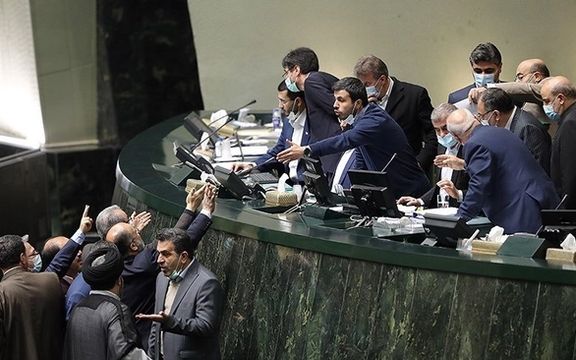
Speaking to Persian-language media funded by "hostile governments" and overseas opposition groups would be deemed espionage under draft legislation in Iran.
The Legal Bureau of the Iranian Parliament's Research Center has drawn up legislation stipulating that Iranian citizens should cooperate with such media outlets only if they can thereby defend the "entity of Islamic Republic."
The draft bill entitled "Raising Punishment for Espionage and Collaboration with Hostile Governments" redefines and broadens the concepts of "espionage" and "hostile government" and criminalizes any cooperation with foreign think-tanks, media, and even charities of "hostile countries".
"Any group, organization or government that is in war with the Islamic Republic, seeks to overthrow it, or takes actions that endanger Iran's national security" − including assisting United States sanctions or exerting economic damage on Iran − would be considered "hostile."
As examples of such media outlets, the draft bill names the BBC, the United States-funded Voice of America, and the London-based TV channels Manoto TV and Iran International.
Sending video footage, audio files, photos, or any data to such media could be considered collaboration with enemies, espionage, or 'corruption on earth,' and thereby punishable by sentences including the death penalty.
Foreign-based opposition media and those affiliated to foreign governments considered hostile, including BBC Persian, are not permitted to maintain offices or post correspondents to Iran. They instead use reports, photos, and video-footage sent through social messaging. Anyone working or cooperating with the named outlets would be required to end their relationship within a month of the bill entering law.
In recent years, Iranian journalists working overseas, including for Iran International, and their family members in Iran have reported harassment and intimidation by security and intelligence bodies, including in the countries where they live and work.
In February the BBC filed a complaint to the United Nations over what it said was harassment of journalists in its Persian-language channels and their families including the freezing of their assets in Iran.
Variety of channels
While the Iranian government has a monopoly on terrestrial broadcasting, Iranians have for at least two decades accessed satellite television channels. The Persian-language channels of the BBC and Voice of America claim a significant audience.
The state broadcaster, Islamic Republic of Iran Broadcasting (IRIB), runs a variety of radio and television channels including several for foreign audiences including the English-language Press TV and Al Alam in Arabic and several other channels in Spanish, French and other languages.
An opinion survey conducted by the state-run Iranian Students Polling Agency (ISPA) in September 2021 found that the of IRIB viewership news had declined since 2016, with its popularity falling between March and September 2021 from 57.7 percent to 42.1 percent.
The Paris-based Reporters Without Borders (RSF) ranked Iran 174 in its 2021 World Press Freedom Index, a measure of freedom experienced by journalists in the country. This put Iran behind Syria and just ahead of Vietnam. RSF has described Iran as one of the world's biggest jailers of journalists.
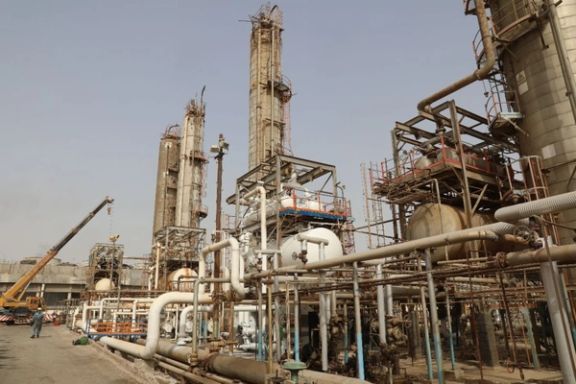
Abadan refinery in south-west Iran, which supplies around 25 percent of the country’s fuel needs, caught fire Thursday.
Hakim Ghayyem, the refinery’s managing director, told IRNA Thursday afternoon the blaze had been contained with no fatalities or injuries, and that an investigation was underway into the damage and cause. The fire broke out at 10.32am, with some reports blaming faulty insulation.
Abadan, near the Persian Gulf coast, is Iran’s largest refinery with a daily capacity of 430,000 barrels of crude, producing liquefied petroleum gas, gasoline, kerosene, gas oil, jet fuel, furnace oil, bitumen, petroleum solvents, sulfur, and naphtha.
China Petroleum & Chemical Corporation (Sinopec) signed a $1-billion deal in 2017 to expand the refinery. Work on a second phase of the project was suspended in March 2020 due to the Covid-19 pandemic.
Abadan, opened in 1912 by the Anglo-Persian Oil Company originally as a pipeline terminus, quickly became one of the world's largest refineries and was an important supplier to the British military.
Earlier in April, an explosion and fire in the Bandar Mahshahr Petrochemical Special Economic Zone in southern Iran injured at least two workers. Several explosions and fires in Iranian military and industrial sites − including pipelines and refineries − since mid-2020 have not been fully explained by authorities.

International non-profit organization Reporters Without Borders (RSF) called on the United Nations Wednesday to take swift action to ensure Iran followed “international human rights law” over the treatment of jailed journalists.
“The advocacy group is alarmed about imprisoned journalists who are denied medical care when they are ill,” RSF said, referring to activist Narges Mohammadi and photojournalist Alieh Motalebzadeh, who are in Qarchak women’s prison, also known as Shahr-e Rey, where health and sanitary conditions are poor and the infirmary ill-equipped.
“Under international human rights law, Iran’s prison authorities have an absolute obligation to ensure the health and well-being of detainees placed under their control by providing them with appropriate, adequate and timely medical care,” said Reza Moini, head of RSF’s Iran-Afghanistan desk.
Mohammadi’s lawyer Mostafa Nili said Tuesday that his client had been deprived of medicine for a week, including pills prescribed after a heart operation.
Reza Khandan Mahabadi, a 60-year-old journalist, was also returned to his prison cell April 5 despite respiratory problems after being hospitalized in January with a severe case of Covid-19.
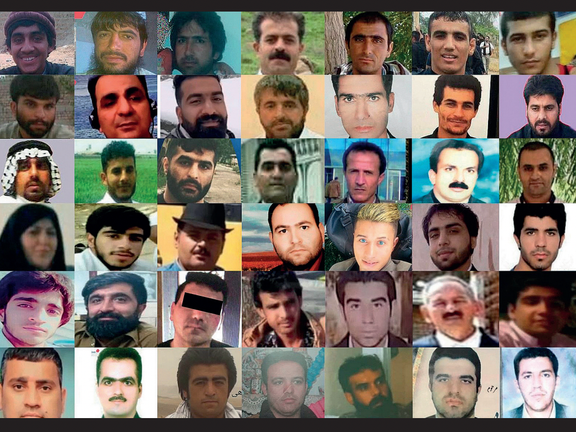
The number of executions in Iran doubled in the second half of 2021 -- around the time when President Ebrahim Raisi took office -- according to figures compiled by two advocacy groups.
Annual Report on the Death Penalty in Iran 2021, published by Oslo-based Iran Human Rights (IHRNGO) and Paris-based Ensemble Contre la Peine de Mort or ECPM (Together Against the Death Penalty), highlighted the rise in numbers and a lack of transparency in both procedures and legislative framework.
The report said at least 333 people were executed in 2021, two thirds in the last six months. This was up from 267 in 2020, with at least 183 executions (55 percent) in 2021 for murder and at least 126 for drug-related offenses. At least two juvenile offenders and 17 women were among those executed.
"The execution rate accelerated after the election of Ebrahim Raeisi as president in June, and doubled in the second half of 2021 compared to the first half", the report said.
At least 139 followed sentences passed by Revolutionary Courts, which have different procedures to other courts, bringing the total of such cases to over 3,758 since 2010.
The report said that 278 executions in 2021 were un-announced by the authorities, and that other executions had not been included due to researchers’ inability to confirm facts.
For the first time in over 15 years, no public executions were reported in 2021 as Iran halted the practice due to Covid-19 restrictions. After a lapse of around 18 months, three sentences of public execution have been passed since March.